Those dead people shaped things while they are alive and exerted influence into the future (like writing the constitution). Most famous people have multiple legacies (Jefferson wrote the D of I and had a slave mistress). Should Jefferson be admired? Finding fault with dead people who are a product of their time and place seems pretty pointless to me. It is fine to rewrite and unsanitize biographies to reveal more accurate pictures of people, but to criticize the value they added to their times and the future because they acted like their friends and relatives is imposing standards they did not have. All those long persons were just people doing the best they could to make their way in this world. Just like you. Just like me.

Condemning Jefferson for having slaves and screwing the girls adds nothing of value to what we need to see change today.
sigh
I don't have any inclination to dictate what
you should admire. You can admire whomever you like. And if you admire Thomas Jefferson, that tells me that you think the ability to crib from John Locke is more worthy of remembrance than owning human beings, rape, eating Napoleon Bonaparte's ass, and being a godawful president. Or you think those other things were actually Good Things, which is even worse.
I think it's kind of ridiculous for you to complain that Phrossack doesn't admire Teddy Roosevelt, though. Like, do you think that there is One List of People Worthy of Admiration that everyone has to follow OR ELSE? And if someone's not on Phrossack's list, well, looks like old Teddy gets consigned to the flames of Hell? Like, why do
you care if he admires the dead guy? Why do
you care what is and is not a deal-breaker for him?
On a side note, most of the time the argument about "standards" in history gets made, it's just poorly informed. To use your example, Jefferson did not live in a time when no one ever thought the institution of chattel slavery was morally wrong. In fact, that view was pretty popular! Hell, Jefferson was a direct contemporary of the crusade to abolish slavery in Great Britain, and they even spoke the same language as he did. Two of his political sparring partners, John and John Quincy Adams, both thought slavery was bad and wrong, Quincy Adams fairly vociferously. Even the institution of slavery itself implicitly acknowledged that slavery was a moral wrong through the existence of things like manumission; the likes of John C. Calhoun were somewhat in the future compared to Jefferson. And one of the things that Jefferson's admirers always bring up is that he was supposedly a smart, well-read guy. The man was a prolific intellectual; if anyone had agency to determine his own morals in eighteenth century America, it was him. It's farcical to claim that there was no possible way he could have come into contact with the notion that what he was doing was morally wrong. Now, the man's upbringing and class certainly conditioned his response and made it relatively unlikely that he would make the choice to stop participating in the great American horror story, but it did not
dictate that he would choose to keep humans in bondage.
It's important to recognize the options that were realistically available to people in the past, and how they weren't always the same as the ones we use for ourselves. Fine. I completely agree. But usually, the "standards" argument about people in the past swings the pendulum too far the other way, by claiming that these Great Men of history (and they are usually men) were norm-shattering, tremendously important humans who did wonderful things while simultaneously refusing to ascribe to them the intellectual ability to determine that (say) slavery is wrong.

 I'm sure many of them were.
I'm sure many of them were. I do send some of my ideas about the solar system (including planet 9) and Earth sciences to researchers, so if you see anyone discovering Pluto may have been a satellite of Saturn they might have gotten it from me.
I do send some of my ideas about the solar system (including planet 9) and Earth sciences to researchers, so if you see anyone discovering Pluto may have been a satellite of Saturn they might have gotten it from me.